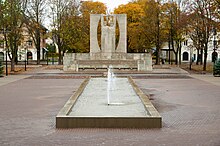Kohtla-Järve is in East Estonia. Kohtla-Järve is an agglomeration of industrial settlements in Eastern Estonia. Separate parts of this unusual and rather conditional city are separated from each other by tens of kilometers. Most of them are dull and uninteresting, but an attentive traveler will find several unique objects here: a slate mine, a slate museum and a curious selection of post-war Soviet architecture, as well as a sea of ruins and industrial color. The center of the agglomeration is a separate and very independent city of Jõhvi, in which the bus station, railway station and all the necessary infrastructure are concentrated.
Understand
[edit]Kohtla-Järve is the industrial center of Estonia, the fifth largest city. Kohtla-Jarve is unique in that it is spread over the region: its districts are in different parts of East Estonia.
As of 2021, 74% of the city's population were ethnic Russians Estonians, and 16% were ethnic Estonians.
The history of Kohtla-Järve is closely tied to the history of extraction of oil shale – the main mineral of Estonia.
Get in
[edit]By train
[edit]The train from Tallinn to Narva stops in the Oru area.
You can take the same train to the city of Jõhvi, near Kohtla-Järve, and then drive 9-10 km by bus or taxi to any part of the city.
However, if you are heading to Viivikonna or Sirgala, it is better to take a different route. Getting to these areas by train, you will have to get off at the Vaivara station, get to the city of Sillamäe by bus, from where there is a direct route to Viivikonna. From Viivikonn to Sirgala you can cross on foot. However, these parts of the city are unlikely to arouse your interest.
By bus
[edit]Any area of Kohtla-Järve can be reached by intercity bus.
Get around
[edit]Intracity transportation in Kohtla-Jarve is carried out by buses, fixed-route and passenger taxis. City bus lines are operated by Atko bussiliinid. Routes are built to connect the city with other areas, and with the neighbouring city of Jõhvi. The city bus station is at the Vironia shopping centre. There is an Oru railway station in the Oru area.
See
[edit]
- 1 Kukruse Manor (Kukruse mõis), Kukruse küla 20, Kukruse, ☏ +372 56876503, +372 53059902, info@kukrusemois.ee.
- 2 Järve Castle (Järve kindluselamu).
- 3 Shale mines and museum, Lehe 10a, Kukruse, ☏ +372 3321353, +372 53359080, info@pkm.ee. Tu–F 10–18:00, Sa 10–16:00. An interesting exhibition about the origin of the oil shale, the history of its extraction and its modern use. All this fits in one large hall, many stands of which have remained since Soviet times and are cute handwritten inscriptions. The second hall is hung with paintings showing the work of miners and other workers in the oil shale industry. It might seem naive, but still nice. Do not miss to talk to the caretakers—they are happy to tell about the past and present of Kohtla-Järve. €2 (2013).

- 4 Valaste Waterfall (along the Ontika cliff, around 10 km north from Jõhvi.). The Valaste waterfall is most impressive in early spring; then, the winter snow is melting and volume of cascading water is greatest. During winter the waterfall freezes and forms fairy-tale like ice sculptures. In 1997, a platform for tourists was built opposite the waterfall. There is a car park, some explanatory signs and a trail using a double spiral staircase to get down the cliff.
Do
[edit]- 1 Kohtla Mining Museum and Park, Jaama 1 (by train to Kohtla-Nõmme stop; by bus no. 43 to Kaevanduspargi stop), ☏ +372 33 24-017. Tu–Sa 11:00 – 17:00. Interactive exposition on the formation of oil shale, its locations, mining and use. Visit to the underground museum and enrichment plant (1.5 hr): adult €23, child or student €15, family ticket €60 (2 adults and 5-19 year old children), children up to 4 years free.
Buy
[edit]Eat
[edit]Drink
[edit]Sleep
[edit]- 1 Hotell Alex, Kalevi 3 (Jarve), ☏ +372 33 9-62-30. Its pub offers sushi. Double room: €53, single €45.
Go next
[edit]


